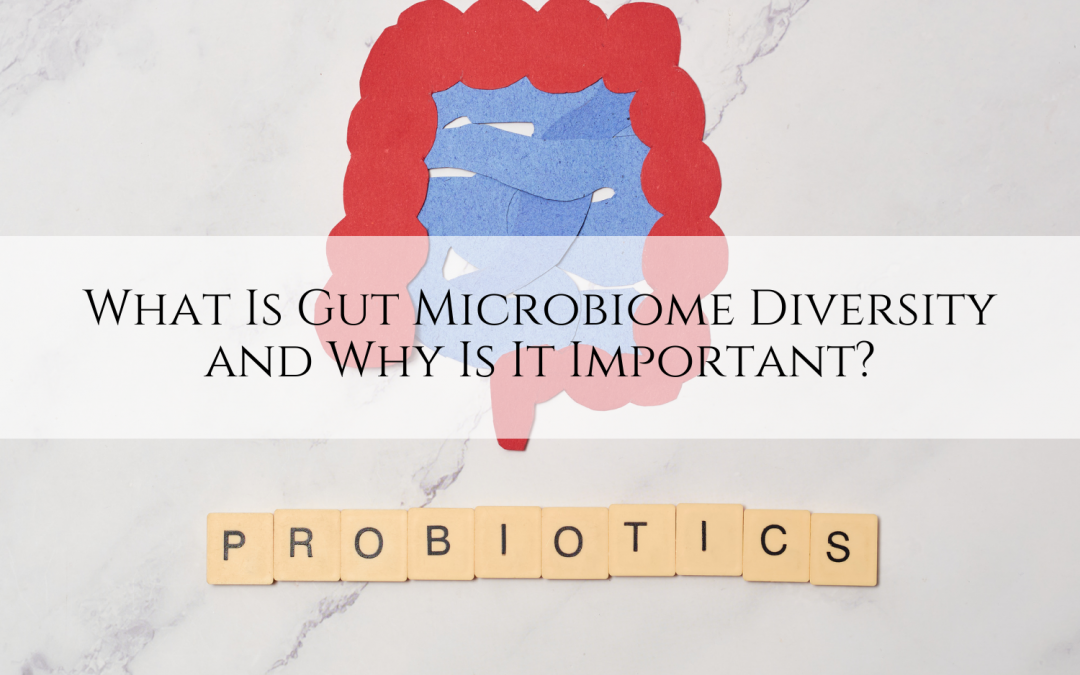The Right Way to Support Your Gut Microbiome Diversity
Most people who want a healthy gut microbiome are going about it all wrong. The tendency is to always try to kill off the bad bacteria. However, the problem is often more complicated than that. In a nutshell, many people are lacking gut microbiome diversity. When dealing with gut health, the goal should be to improve the diversity of the gut microbiota.
Improving gut microbiome diversity involves not only killing off the bad bugs, but also building a healthy overall microbiome. Good bacteria must be plentiful. It’s really all about achieving a healthy balance.
What Is Gut Microbiome Diversity?
The gut microbiota refers to the collection of bacteria, fungus, and other microbes living in the gastrointestinal tract. The “gut microbiome” is a popular term referring to the community of microbes that live inside the human gut. However, when scientists use the term “gut microbiome” literally, they are talking about all of the genes inside the microbes that live in the intestines.
By diversity, we mean that the gut microbiome is made up of a wide variety of different bacterial species and other microbes. When there is low diversity, specific types of good bacteria are reduced, allowing infectious agents to take hold and thrive. A healthy and diverse array of beneficial microorganisms can better protect you from foreign invaders and better promote overall health.
High gut microbiome diversity supports a healthy inflammatory response in the intestines. It keeps the immune system strong and reduces gut barrier permeability (leaky gut).
Imbalanced gut microbiota is believed to be one factor in the development of autoimmune disease. Low diversity reduces your tolerance to allergens and sets you up for imbalanced gut bacteria (also known as dysbiosis), among other negative effects.
The benefits of a healthy, diverse microbiome are countless. The gut microbiome helps to balance estrogen. Imbalanced gut bacteria can lead to hormonal imbalances, such as higher estrogen levels. Through their production of short chain fatty acids, the gut microbiota play an important role in what scientists call the gut-brain axis. This simply means the health of the gut can affect the health of the brain. An unhealthy gut microbiome can lead to health conditions related to cognitive function.
Health Conditions Related to Low Diversity
Low diversity of the gut microbiome is linked to a number of health conditions. These include:
- Asthma
- Autoimmune diseases, such as multiple sclerosis and rheumatoid arthritis
- Brain disorders
- Chemical sensitivities
- Chronic fatigue
- Eczema
- Environmental sensitivities (seasonal allergies)
- Food sensitivities
- Hormone imbalances
- Inflammatory bowel disease (IBD, ulcerative colitis, and Crohn’s)
- Irritable bowel syndrome (IBS)
- Loss of oral tolerance
- Loss of immune tolerance
- Obesity
High or low levels of specific bacteria are linked to specific conditions. For example, high levels of the Bacteroides-Prevotella group of bacteria are associated with IBS, IBD, metabolic syndrome (a cluster of risk factors for heart disease), chronic fatigue, autoimmune diseases, type 2 diabetes, high blood pressure, and mood disorders. Low levels of bacteria like Ruminococcus and Akkermansia are associated with those same illnesses.
What Harms the Gut Microbiome?
A number of factors can disrupt gut microbiome diversity. Eating processed and sugary foods, for example, or simply foods to which we are sensitive, can harm the gut microbiota.
Toxins from exposure to pesticides, herbicides, and other chemicals can also impact the gut microbiome.
What’s more, long-term use of botanicals that have antimicrobial actions can harm the gut microbiome. For example, some people take berberine for blood pressure or blood sugar, but berberine is naturally antimicrobial and could kill off beneficial bacteria along with the bad.
Infections are another factor that wipe out the good bacteria. And antibiotics taken for those infections destroy our beneficial bugs and can change the lay of the land in your intestines. Antibiotics can also show up in red meat that isn’t organic or grass-fed.
Certain diets can also impact the gut microbiome. Many people with IBS and IBD are on a low-FODMAP diet. FODMAP is short for Fermentable Oligo-, Di-, Mono-saccharides, and Polyols. In simple terms, this means a diet low in fermentable carbohydrates. Since good bacteria feed on these types of carbohydrates, a low-FODMAP diet is associated with a reduction in the beneficial bacteria known as bifidobacteria and an increase in bacteria that cause gut microbiota dysbiosis and reduced gut microbiome diversity.
How to Increase Gut Microbiome Diversity
- Avoid personal care and household products that have ingredients that interfere with a healthy gut microbiome. Choose products that don’t have phthalates, triclosan, or parabens, all chemicals that can alter the gut microbiota.
- Choose organic food. Non-organic vegetables and some fruits are often sprayed with the herbicide glyphosate. Research has shown that glyphosate kills many beneficial bacteria while having no effect on potentially damaging bacteria such as Clostridium spp. and Salmonella. Consequently, scientists have suggested that glyphosate causes gut microbiome dysbiosis. Other pesticides and herbicides sprayed on produce can also disrupt the gut microbiota.
- Eat a variety of phytonutrients and fibers. A diverse and healthy diet equal a diverse gut microbiome. Your gut microbiota live on polyphenols, which are the substances in fruits and vegetables that give them their beautiful colors. Fiber and resistant starch are prebiotics in food that feed and grow your diverse gut microbiome.
- Take a gut microbiome supplement. Probiotic supplements can be beneficial, but your best bet is to take both probiotics with prebiotics. Probiotics and prebiotics, when taken together, are called synbiotics. Probiotics are beneficial bacteria given as a supplement, while prebiotics are substances like inulin and galactooligosaccharides that feed the good bacteria. Synbiotic supplements boost the abundance of beneficial gut bacteria and increase gut microbiome richness.
- Avoid foods that cause pathogenic bacteria to flourish. These include refined carbohydrates made from white flour and anything sweetened with sucrose such as pies, cakes, cookies, and cereals. Read ingredient labels and watch for hidden sources of sugar such as pasta sauces. Choose whole foods instead of processed foods in packages.
- Opt for an anti-inflammatory diet (AID). An AID diet includes lots of fruits and vegetables, foods rich in omega-3 fatty acids, whole grains, lean protein, healthy fats, and spices. People on this type of diet avoid processed foods, red meat, and alcohol. This type of diet includes lots of prebiotic foods that feed the beneficial bacteria.
What Foods Are Good for Your Gut Microbiome?
A gut microbiome diet includes probiotics in foods and prebiotics in foods. The goal is to eat as many food sources of prebiotics and probiotics, including fermented foods. Eating lots of fruits and vegetables is also good for your gut microbiome since they are high in fiber and in polyphenols, which can boost the growth of beneficial bacteria. Research found that eating a diet high in fruits and vegetables blocked the growth of specific disease-causing microbes.
Probiotics and Prebiotics List of Foods
- Apples
- Bananas
- Beans
- Broccoli
- Chickpeas
- Green peas
- Kefir
- Kimchi
- Lentils
- Raspberries
- Sauerkraut
- Unsweetened yogurt
- Whole grains
Get more ideas for probiotic and prebiotic foods in our blog, “Feeding the Trillions of Good Bugs in Your Gut for Better Health.”
Do You Have A Diverse Gut Microbiome?
The best way to answer this question is to schedule a consultation with a functional medicine provider like those at Caplan Health Institute. We can order gut microbiome testing, which will show whether you have a diverse gut microbiome and which bacteria might be throwing your microbiome out of balance.
I invite you to schedule a 15-minute complimentary call with the Caplan Health Institute, so that we can help you balance your gut microbiome. The goal? Get rid of bothersome gut symptoms and optimize your immune health, so that you can thrive and feel well again.
Board Certified in Integrative Medicine
Certified Functional Medicine Practitioner
Institute for Functional Medicine Certified Practitioner






